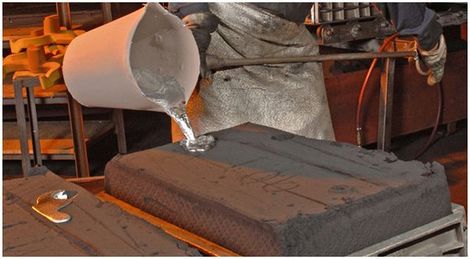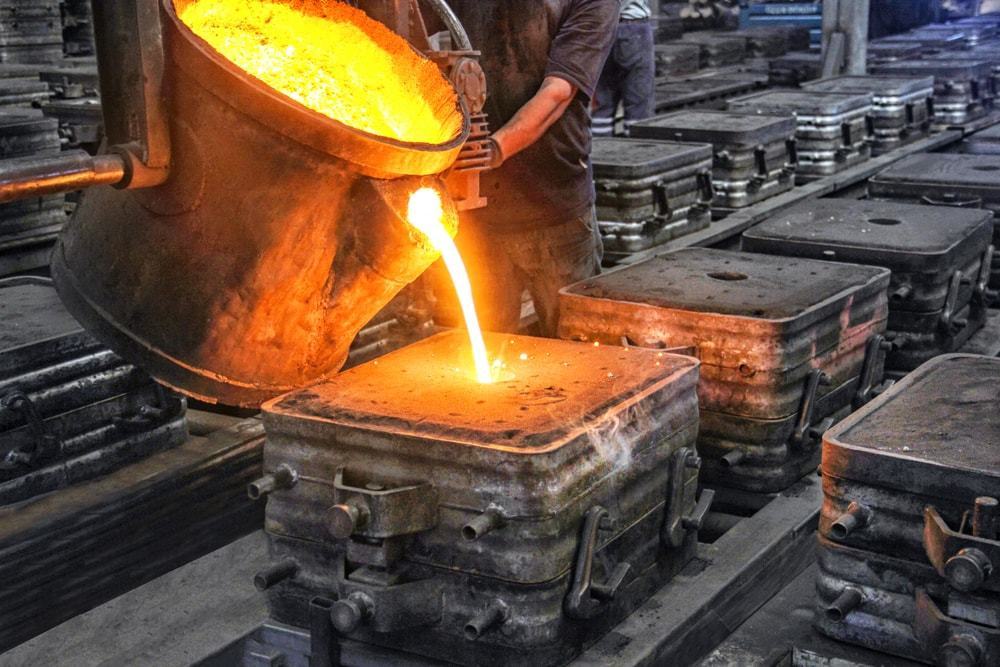What makes an Aluminum Foundry the preferred choice for precision manufacturing
Wiki Article
Checking out the Function of a Metal Foundry in Modern Manufacturing Processes
Metal foundries are critical in the landscape of contemporary manufacturing. They provide critical components throughout numerous markets, adapting to the demands of industries such as auto and aerospace. Advanced strategies such as 3D printing and automated casting have actually transformed their operations. In addition, sustainability has actually come to be a concern, influencing their techniques. As these foundries evolve, the effects for producing efficiency and technology are considerable, raising inquiries about their future trajectory in an ever-changing economic situation.The Development of Metal Casting Techniques

With the surge of mass production, foundries adopted approaches like die casting and lost foam casting, improving the manufacturing process and minimizing waste. Each advancement in metal casting techniques has satisfied the needs of various industries, from automobile to aerospace. As metal casting remains to advance, the interplay between strategy and modern technology remains critical in meeting modern production obstacles, making certain that foundries flourish and adjust in an ever-changing landscape.
Assimilation of Advanced Technologies in Foundries
Traditional metal casting approaches have actually served the industry well for centuries, the assimilation of sophisticated technologies in foundries is revolutionizing the production landscape. Automation and robotics improve production processes, improving performance and reducing the threat of human mistake. Technologies such as 3D printing enable for rapid prototyping and the production of complicated geometries that were once impossible with conventional approaches. Additionally, information analytics and the Web of Things (IoT) allow real-time monitoring and anticipating maintenance, eventually leading to minimized downtime and increased performance. These developments also assist in personalization, allowing makers to react rapidly to market needs. As sustainability ends up being a priority, the fostering of ecologically pleasant innovations, such as electrical melting heating systems and progressed sand reclamation systems, additionally shows the industry's commitment to technology. Collectively, these innovations not just boost operational effectiveness yet likewise placement foundries at the forefront of contemporary production techniques.The Influence of Material Science on Foundry Workflow
Product scientific research plays a critical function in improving factory procedures, influencing both the selection of products and the overall casting process. Breakthroughs in material science supply a deeper understanding of the properties of metals and alloys, allowing foundries to pick one of the most ideal products for details applications. This understanding improves the performance and longevity of cast items, which is crucial for fulfilling industry criteria.Advancements in material formulations and ingredients add to improved casting techniques, enhancing and decreasing defects manufacturing effectiveness. The development of innovative metal compounds and smart products allows foundries you could look here to produce lighter, more powerful components, which are significantly searched for in various sectors such as auto and aerospace.
Furthermore, material scientific research help in the recycling of metals, making procedures much more effective and affordable. By leveraging the most up to date searchings for in material scientific research, foundries can adapt to progressing market demands, guaranteeing their competitiveness in a swiftly changing production landscape.
Sustainability Practices in Modern Metal Foundries
With the growing emphasis on ecological obligation, modern-day metal foundries are increasingly applying sustainability methods to minimize their environmental impact (Aluminum Casting). One essential strategy involves the recycling of scrap metal, which not just lowers waste but likewise preserves power and basic materials. Foundries are taking on advanced melting innovations that boost energy effectiveness, subsequently decreasing greenhouse gas discharges. In addition, using eco-friendly coatings and materials has acquired grip, more reducing damaging exhausts throughout manufacturingWater conservation techniques, such as closed-loop cooling systems, are being carried out to minimize freshwater usage. Numerous foundries are likewise purchasing renewable resource resources, like solar and wind, to power their procedures, therefore decreasing reliance on fossil fuels. Team training programs concentrated on sustainability practices advertise a culture of environmental understanding within the labor force. These efforts jointly contribute to a much more sustainable future for metal foundries while meeting the demands of eco-conscious customers.
The Future of Foundries in a Transforming Economic Landscape
As the international economic climate progresses, foundries deal with a myriad of difficulties and chances that will shape their future (Aluminum Casting). The boosting need for lightweight products and advanced alloys requires technology in manufacturing methods and technical combination. Automation and clever production techniques are becoming essential for improving performance and reducing functional costs. In addition, the rise of sustainability issues forces foundries to take on greener procedures and reusing campaigns, lining up with international ecological goalsThe economic landscape is additionally moving, with supply chain interruptions and rising and fall resources rates offering significant obstacles. Foundries need to adapt by diversifying why not find out more their supply sources and buying products scientific research. Collaboration with industries such as sustainable energy and electrical lorries can foster growth. Ultimately, the future of foundries will certainly rely on their capability to leverage technical innovations while remaining receptive to market characteristics and ecological imperatives, guaranteeing their importance in modern production.
Regularly Asked Inquiries
What Types of Metals Are Frequently Used in Foundries Today?
Frequently made use of steels in foundries today include light weight aluminum, iron, zinc, copper, and steel. These products are preferred for their varied homes, enabling a broad array of applications in industries such as automobile, view aerospace, and building and construction.How Does a Factory Make Certain Quality Control in Its Products?

What Precaution Are Implemented in a Metal Foundry?
Metal foundries implement precaution consisting of personal safety tools, air flow systems to decrease breathing of fumes, regular safety and security training for employees, emergency situation feedback procedures, and extensive devices upkeep to decrease threats and ensure a secure workplace.The length of time Does the Metal Casting Refine Generally Take?
The metal casting process generally takes a number of hours to days, depending upon variables such as the intricacy of the mold, the type of metal utilized, and cooling down times. Each project's needs substantially affect the duration.What Industries Mainly Rely Upon Metal Foundries for Production?
Automotive, machinery, construction, and aerospace industries mostly count on metal foundries for production. These industries use cast steels for elements, making certain durability and performance important for their particular applications in manufacturing and assembly procedures.
Metal foundries are pivotal in the landscape of contemporary manufacturing. Metal Casting. Standard metal casting approaches have actually offered the market well for centuries, the assimilation of sophisticated technologies in foundries is changing the manufacturing landscape. Advancements in product scientific research supply a much deeper understanding of the properties of metals and alloys, making it possible for foundries to select the most ideal products for certain applications. With the expanding emphasis on ecological responsibility, modern-day metal foundries are significantly executing sustainability techniques to minimize their environmental footprint. Automotive, building, aerospace, and equipment industries mostly rely on metal foundries for production
Report this wiki page